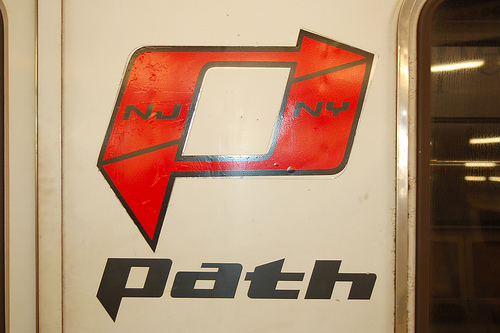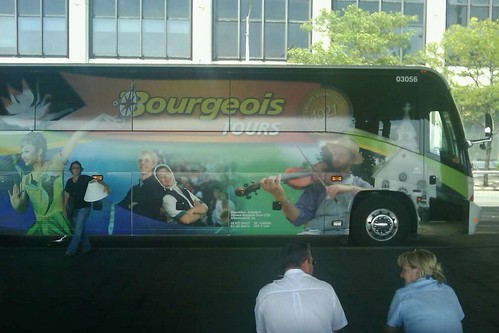August 27, 2009
Category: Uncategorized — Biella @ 6:01 pm
One of the best things about living in NYC is the music. It is overflowing here, so much so, I honestly get a little overwhelmed. But every few months I decide: I am going to see a string of live shows and do so and then retreat for a few months until I can muster up the will and money to dive again.
The picks for the next few weeks are a local NYC Indie-folk band Kind Monitor playing around the corner from me in Joe’s Pubs (there are rumors it will start with a Ukulele act!) And then soon after I will see The Cave Singers from Seattle playing at the Bowery Ballroom. I hope to catch The Books but they are not passing through anytime soon, which brings me to the tech-related part of the post..
I am surprised–and could be wrong and hope that I am proven wrong–that there is no webbie 2.something tool/site that allows you to punch in your favorite bands and zip code-mile radius and that then sends you email alerts for up and coming concerts.
Category: Uncategorized — Biella @ 5:25 pm

Security Conference in the tri-state area! Looks great and they have a great title.
ps– I am sure this won’t turn up a response but what the heck, this post is about security and dogs: If you want a real security dog who is compact and a DOLL/sweet-as-good at home, I have the dog for you. Pictured above. I am serious.
Category: Uncategorized — Biella @ 1:57 pm
A few updates on the EveryBlock case and the Knight Foundation. Tieguy (Luis Villa) left a comment which I am quoting in full below:
That said, it is entirely possible that Knight was ill-advised and believed (as many casual users do) in the magical power of open source licenses to create community. If this did indeed catch Knight off guard, it might be worth pulling people together to discuss best practices for grant-making organizations who want to create real value and not just lumps of well-licensed code.
Related to this, Berkman has released a whitepaper on (apparently) just this topic today. Probably worth checking out for folks interested in this topic.
Then there is this excellent interview led by Jonah Bossewitch with Chris Mackie who is a program office at Mellon.
Update: Here are some thoughts I penned down very very quickly in response to the interview:
1. I can see the argument about complex software products benefiting
from the BSD: at the same time I can totally see the value of just
keeping it open as well so everyone can benefit from improvements to
something that is as complex as Chris points point. Also if you keep
it totally internal to your shop, you don’t need to re-release,
although if you want to combine propriety and non-proprietary software
and then re-release I can see the value of the BSD code
2. When it comes to the question of ownership, where he says IP trumps licenses,
Chris Mackie does not seem to link the complexity of project to the licenses. When I was
having a discussion about this on Debian-devel, a number of folks
mentioned how very complex projects with many contributors, each who
had copyright and asserted GPL, worked through this swarm to protect
one person trumping ownership at some future point. They saw this as a
feature, not a bug, which I completely agree with. So some projects
are –and please correct me if I am wrong–far far more susceptible to
of weakness of the licenses if 1) they don’t hand over to a
trustworthy organization, like the FSF or the copyrights are held in a
few small hands. Once you start spreading the copyrights over a large
mas of people, it becomes very very difficult to ever assert a
copyright up and above the GPL.
Category: Uncategorized — Biella @ 5:51 am
August 25, 2009
Category: Uncategorized — Biella @ 9:11 am
We found this bus at South Street Seaport on Sunday. Someone thought I was photo shopped in but I was really there, lampshade and all. Someone should tell the bus owner that he/she needs to replace the image with something less Amish-like/Chinese-ice-skater and more fitting.
Category: Uncategorized — Biella @ 8:33 am
The Inaugural Interdisciplinary Conference of the Virtual Communication, Collaboration and Conflict (VIRT3C) Research Group at the University of Hull has circulated a call for papers:
Our plenary theme is ‘Developing the Virtual Society: Conflict in Adoption of Online Collaborative Networks’. As virtual society develops, and peer technologies and practices pump in its heart, this conference brings together academics of all disciplines to discuss conflict in the adoption of collaborative networks. This is a time of confrontation between older forms of communication and organization and new ways of sharing, collaborating and acting collectively. We seek to explore conflicts emerging in the transition from, and resistance to, horizontal participatory networks, as well as conflict within collaborative networks. We welcome suggestions for panels and papers on any area relating to our theme, and particularly in the following areas:
• Network Theory
• P2P and FLOSS methodology adoption
• FLOSS methodology
• Open source conflicts and forking
• Adoption by NGOs and the developing world
• Adoption by social movements, hacktivism, cyberconflict
• Institutional resistance to networks
• Online P2P places and conflicts
We encourage especially contributions, including, but not limited to, politics, economics, computer science, business, psychology, sociology, and law.
With your abstract of no more than 300 words please include the following information:
Name, postal address, email
Institutional affiliation and position (if applicable)
Please send abstracts in Word or pdf format to the organisers at
athina.k((((((@)))))gmail.com
Provisional Deadline for abstracts: 15th January 2010
August 23, 2009
Category: Uncategorized — Biella @ 8:07 am

For those in New York and interested in Public Transit and getting reliable information from the beast of an organization that is the MTA, you may be interested in the Public Transit Data Summit with beer!
WHERE: 148 Lafayette St, NY, New York, 12th floor (map)
WHEN: Tuesday, August 25 at 6pm
WHAT: Meetup to discuss how the MTA and the developer community can best collaborate.
I doubt the Path will receive much air time but I just had to include the logo above as it is my favorite transportation logo, not only because it looks cool but it signals the TIGHT relationship between NJ/NY, a relationship that nonetheless can be pretty tense. Here though is the relationship represented in Total Harmony.
August 18, 2009
Category: Uncategorized — Biella @ 9:55 am
Chris Anderson, who is mentioned in my previous post on Everyblock, has penned a very thoughtful blog post The Nuances of the Everyblock Sale to MSNBC. He sums up the debate so far and raises some interesting new points. It provides a great summary of some basic legal points in conversation with the particular case.
His conclusion included below:
I’d like to see all future versions of code devloped under the Knight grant remain open, whoever buys them. I think this is an ethical use of Knight grant money — and a good business strategy as well.
ps– a number of folks have told me that “grassroots” is def not the way they would describe Everyblock, even among those who think it is a pretty neat project.
update: (linked fixed) Here is another exxxceelllent blog entry about code. community, and foundations by John Eckman’s who finishes with this important insight:
Put differently, communities are great at creating (and maintaining, supporting, extending) code: code is not great at creating communities.
August 17, 2009
Category: Uncategorized — Biella @ 4:02 pm
So my buddy Chris Anderson, a fellow digital/comm scholar pointed me to this very interesting case concerning an open source project, originally funded by a foundation that was just sold to a Large Corporation. Here are the details:
Everyblock is/was a grassroots journalism web-based project that got a kick start thanks to a 1.1 million grant provided by the Knight Foundation. The project, as its name, suggests, reports on uber-local news, like your hood, your block. That sort of thing. Laudable stuff. The Knight Foundation required that the code be open source and it looks like there is a GPLv3 attached to the codebase.
Apparently, Everyblock was just acquired by MSNBC. At question is not only whether the future of its codebase will remain open but whether it is ethical to take foundation money and turn around such a high profit from a corporate buy out.
Chris, whose passion is grassroots journalism, has been tracking development and has noted some of this ethical and possibly legal quandaries. As he noted on Gawker:
That’s not good enough, says CUNY assistant professor Christopher Anderson, who writes that MSNBC has skimmed off the value of a project “developed by common labor;” Anderson is upset in part because it’s not clear whether EveryBlock’s code will remain openly available. NYU Local publisher Cody Brown has called for more transparency around the deal.
Whether or not one agrees selling a foundation-funded project to a corporation is kinda dodgy or not, the legal question remains: since the code is under a GPL3, doesn’t MSNBC have to also keep it under the same license if modified? Or can they take the code base since Everyblock is a web-based service? (I really am looking for answers here).
August 15, 2009
Category: Uncategorized — Biella @ 7:25 am
A two-three day vacation is starting now. I so need it. I have stared at this screen for too many hours this summer.






